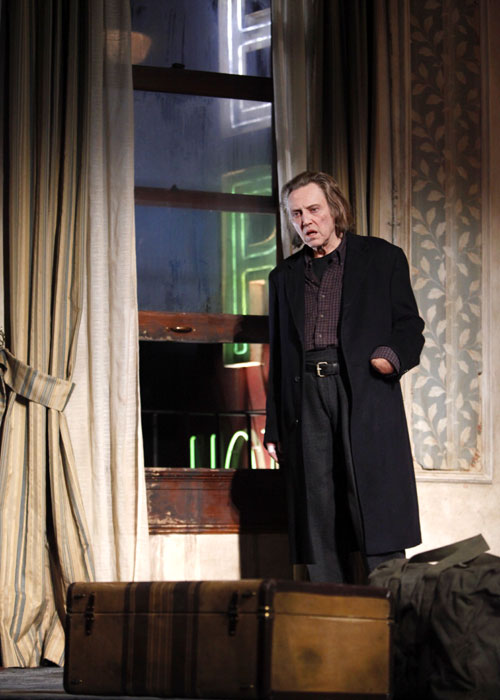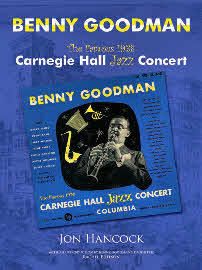Today’s Wall Street Journal column, written in the interstices of my service on a Manhattan jury, gives thumbs up to two new Broadway shows, Martin McDonagh’s A Behanding in Spokane and the first Broadway revival of William Gibson’s The Miracle Worker. Here’s an excerpt.
* * *
When blood is shed in a Martin McDonagh play, the audience always laughs–and usually gasps. Mr. McDonagh is partial to comic violence, and in “A Behanding in Spokane” he lets it rip. I mustn’t be too specific, this being a play full of grisly surprises, but there’s one thing about which I can be absolutely precise: “A Behanding in Spokane” is the funniest new play to open in New York since I started writing this column.
 “Behanding” is the first of Mr. McDonagh’s plays to be written specifically for Broadway and the first set on this side of the Atlantic, though I confess to finding his America hard to tell from his Ireland, both being full of more or less demented blabbermouths. In “Behanding” we meet four, the looniest of whom is Mr. Carmichael (Christopher Walken), a homicidal maniac who has spent the past 47 years searching for his left hand, from which he was involuntarily separated by “six hillbilly bastards” who lived to regret their little prank. Now he’s gone to ground in a hotel managed by another fast-talking lunatic (Sam Rockwell) and is about to dispose of a couple of small-time crooks (Zoe Kazan and Anthony Mackie) who made the mistake of trying to sell him a phony hand.
“Behanding” is the first of Mr. McDonagh’s plays to be written specifically for Broadway and the first set on this side of the Atlantic, though I confess to finding his America hard to tell from his Ireland, both being full of more or less demented blabbermouths. In “Behanding” we meet four, the looniest of whom is Mr. Carmichael (Christopher Walken), a homicidal maniac who has spent the past 47 years searching for his left hand, from which he was involuntarily separated by “six hillbilly bastards” who lived to regret their little prank. Now he’s gone to ground in a hotel managed by another fast-talking lunatic (Sam Rockwell) and is about to dispose of a couple of small-time crooks (Zoe Kazan and Anthony Mackie) who made the mistake of trying to sell him a phony hand.
You’re welcome to interpret “A Behanding in Spokane” as a fable about two lost souls who have more in common than they realize–Mervyn, the hotel clerk, is fully as interesting a character as the mysterious Mr. Carmichael–or you can relax and revel in the virtuosity with which Mr. McDonagh stuffs wildly funny words into the mouths of his cast. Either way, you’ll spend an hour and a half laughing nonstop….
William Gibson’s “The Miracle Worker,” first seen on Broadway in 1959, is the inspirational story of a secular saint, Helen Keller, who overcame the direst of handicaps (an illness left her blind and deaf when she was 19 months old) to become a legend in her own time. It is also a tour de force for a child actress, which is a polite way of saying that “The Miracle Worker” is a theatrical stunt, a play whose star (Abigail Breslin) speaks only one word, “wa-wa,” spending the rest of the evening grunting, moaning, kicking her co-star and throwing food every which way. But if “The Miracle Worker” is a stunt, it is a wholly honorable one, and no one can fail to be moved when Annie Sullivan (Alison Pill), Keller’s teacher, parts the dark curtain of her handicap and leads her by the hand into the bright world of language.
Prior to this production, “The Miracle Worker” had never been revived on Broadway, presumably because it was made into a hugely successful, deservedly well-remembered movie in 1962. Now it has been mounted as a vehicle for the 13-year-old Ms. Breslin, who was delightful in “Little Miss Sunshine” and is downright remarkable in “The Miracle Worker.” Her empty stare, anguished howls and frantic physicality add up to a jarringly intense performance, and the inner glow that lights her face when she first realizes that everything in the world has a name is the stuff first-class acting is made of….
* * *
Read the whole thing here.
Here’s a clip from a 1928 newsreel featuring the real-life Helen Keller and Anne Sullivan:
TT: The unsure artist
 I recently finished reading an excellent new book by Jon Hancock about Benny Goodman’s 1938 Carnegie Hall debut. The concert, which was released as a long-playing record album in 1950 and is still in print to this day, was a landmark event, the first time that an entire evening of jazz was presented at America’s best-known and most prestigious concert hall. It was also an exceedingly risky proposition for Goodman, who in 1938 was the equivalent of a swing-era rock star. Such folk didn’t go anywhere near Carnegie Hall in the Thirties, and as I read Hancock’s book, I asked myself: why did a successful performer like Benny Goodman feel the need to give a concert there? It occurred to me that Goodman, who had extensive classical training and spent much of the rest of his life playing Brahms and Mozart in addition to the jazz that made him famous, might have questioned his own musical worth and felt that a Carnegie Hall appearance would give him cultural legitimacy.
I recently finished reading an excellent new book by Jon Hancock about Benny Goodman’s 1938 Carnegie Hall debut. The concert, which was released as a long-playing record album in 1950 and is still in print to this day, was a landmark event, the first time that an entire evening of jazz was presented at America’s best-known and most prestigious concert hall. It was also an exceedingly risky proposition for Goodman, who in 1938 was the equivalent of a swing-era rock star. Such folk didn’t go anywhere near Carnegie Hall in the Thirties, and as I read Hancock’s book, I asked myself: why did a successful performer like Benny Goodman feel the need to give a concert there? It occurred to me that Goodman, who had extensive classical training and spent much of the rest of his life playing Brahms and Mozart in addition to the jazz that made him famous, might have questioned his own musical worth and felt that a Carnegie Hall appearance would give him cultural legitimacy.
Needless to say, Goodman was by no means the first artist to suffer from deep-seated doubts about his work. Any number of other major artists, including John Keats and Benjamin Britten, have found their private fears to be at times all but incapacitating. My “Sightings” column for Saturday’s Wall Street Journal speculates on what causes great artists to question their own accomplishments–and whether such self-doubt is always a bad thing. If you’re curious, pick up a copy of tomorrow’s Journal and see what I have to say.
UPDATE: Read the whole thing here.
TT: Almanac
“Having led a vicious but not unpleasant life for a vast number of years I am conscious that there are difficulties which even the best brought-up young men cannot always avoid and being as you know a hardened cynic I have a great tolerance for the follies of the human race.”
W. Somerset Maugham, letter to Robin Maugham (his nephew), June 5, 1934
TT: So you want to see a show?
Here’s my list of recommended Broadway, off-Broadway, and out-of-town shows, updated weekly. In all cases, I gave these shows favorable reviews (if sometimes qualifiedly so) in The Wall Street Journal when they opened. For more information, click on the title.
Warning: Broadway shows marked with an asterisk were sold out, or nearly so, last week.
BROADWAY:
• Fela! * (musical, PG-13, adult subject matter, reviewed here)
• God of Carnage (serious comedy, PG-13, adult subject matter, reviewed here)
• South Pacific (musical, G/PG-13, some sexual content, brilliantly staged but unsuitable for viewers acutely allergic to preachiness, reviewed here)
• A View from the Bridge * (drama, PG-13, violence and some sexual content, closes Apr. 4, reviewed here)
OFF BROADWAY:
• Avenue Q (musical, R, adult subject matter and one show-stopping scene of puppet-on-puppet sex, reviewed here)
• The Boys in the Band (drama, R, adult subject matter, closes Mar. 28, reviewed here)
• The Fantasticks (musical, G, suitable for children capable of enjoying a love story, reviewed here)
• The Orphans’ Home Cycle, Parts 1, 2, and 3 (drama, G/PG-13, too complicated for children, now being performed in rotating repertory, closes May 8, reviewed here, here, and here)
• Our Town (drama, G, suitable for mature children, reviewed here)
• Venus in Fur (serious comedy, R, sexual content, closes Mar. 28, reviewed here)
CLOSING SOON IN LENOX, MASS.:
• Les Liaisons Dangereuses (drama, R, violence and sexual content, closes Mar. 21, reviewed here)
CLOSING NEXT WEEK IN ORLANDO, FLA.:
• Hamlet (Shakespeare, PG-13, closes Mar. 13, reviewed here)
CLOSING SUNDAY IN MANALAPAN, FLA.:
• Sins of the Mother (drama, PG-13, violence and adult subject matter, reviewed here)
TT: Almanac
“It’s very hard to be a gentleman and a writer.”
W. Somerset Maugham, Cakes and Ale
OGIC: True to words
The writer Barry Hannah died yesterday. I’ve read only one of his books, the 2001 novel Yonder Stands Your Orphan, but it definitely got my attention. The plot is a hectic, amped-up brand of southern gothic. The words always felt to me more important and satisfying than the story they told, though. They’re strung into wonderful, unexpected sentences that glint from the page, and those into paragraphs of similar quality. My love of the book rested on its words and sentences. You know how Olympic winners assessingly lift their new medals in surprise at the heft of them? I feel a little like that encountering a word like “slabby” in the following passage.
In Vicksburg, on the asphalt, the deflected minions of want walked, those who lived to care for and feed their cars, and she watched them outside Big Mart. And the sad philosophic fishermen who lived to drag slabby beauties from the water, that dream of long seconds, so they told her. About the same happy contest as sexual intercourse, as she recalled it, though these episodes sank deeper into a blurred well every day. She loved the men and their lostness on the water. Their rituals with lines and rods and reels and lures. The worship they put into it. How they beleaguered themselves with gear and lore, like solemn children or fools. She had spent too much time being unfoolish, as if that were the calling of her generation. As you would ask somebody the point of their lives and they would answer: horses
Maud Newton, who’s crushed by Hannah’s loss, has posted several worthwhile links, including one to a strikingly frank Paris Review interview with the author. “The talent of word facility,” he says, “is unteachable and uncoachable….I believe you should have the words handy. Not that they all have to be perfect–there’s a lot of cross-outs–but language-to-hand is the sine qua non.”
TT: Snapshot
William Primrose plays Paganini’s Caprice No. 24 on viola, with David Stimer at the piano:
(This is the latest in a weekly series of arts-related videos that appear in this space each Wednesday.)
TT: Almanac
“I am often tired of myself, and I have a notion that by travel I can add to my personality and so change myself a little. I do not bring back from a journey quite the same self that I took.”
W. Somerset Maugham, The Gentleman in the Parlour
